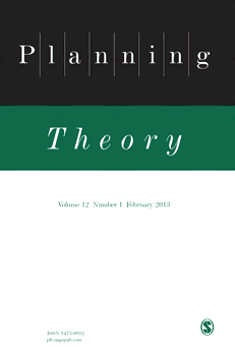
Planning Theory
Scope & Guideline
Exploring New Paradigms in Planning Methodologies
Introduction
Aims and Scopes
- Critical Examination of Planning Theories:
The journal emphasizes critical perspectives on existing planning theories, exploring their implications for practice and policy-making. - Focus on Social Justice and Equity:
Research published in the journal frequently addresses issues of social justice, equity, and the role of planning in fostering inclusive communities. - Interdisciplinary Approaches:
The journal encourages interdisciplinary methodologies, integrating insights from sociology, political science, economics, and environmental studies to enrich planning discourse. - Community Engagement and Participation:
There is a strong emphasis on participatory planning processes, with research highlighting the importance of public involvement in planning decisions. - Global Perspectives:
The journal includes a diverse range of geographical contexts, particularly focusing on planning issues in the Global South, thus broadening the scope of planning theory. - Innovative Planning Practices:
Research often explores new and emerging practices in planning, including digital tools, co-production, and informal planning strategies.
Trending and Emerging
- Post-Growth and Degrowth Planning:
Recent publications are increasingly addressing the concepts of post-growth and degrowth, emphasizing sustainable practices that challenge traditional economic growth paradigms. - Digital Transformation in Planning:
Emerging research focuses on the impact of digital technologies on planning processes, governance, and community engagement, highlighting the role of data and digital tools. - Justice and Equity Frameworks:
There is a growing interest in frameworks that promote social and spatial justice, particularly in urban development and community planning. - Informal Planning Practices:
Research on informal planning practices is gaining traction, particularly in the Global South, as scholars seek to understand the dynamics of informal settlements and community-led initiatives. - Climate Resilience and Adaptation Strategies:
The journal is increasingly focusing on climate resilience, with studies exploring adaptive planning strategies that address climate change effects on urban environments. - Collaborative and Co-Production Approaches:
There is a notable trend towards collaborative planning frameworks that involve diverse stakeholders in the decision-making process, fostering greater community ownership.
Declining or Waning
- Traditional Rational Planning Models:
There has been a noticeable decrease in publications focusing on conventional rational planning models, as the field increasingly embraces more flexible and adaptive approaches. - Strictly Technical Planning Approaches:
Research that prioritizes purely technical solutions over socially informed practices has diminished, reflecting a growing recognition of the need for context-sensitive planning. - Urban Development as Isolated Discipline:
The exploration of urban planning as a standalone discipline has waned, with a shift towards more integrated approaches that consider social, economic, and environmental dimensions. - Overemphasis on Quantitative Methods:
The reliance on quantitative methodologies without qualitative insights is decreasing as the journal shifts towards more holistic approaches that capture the complexities of planning contexts. - Neglect of Historical Context in Planning:
There is a reduced focus on historical analyses of planning practices and theories, as contemporary issues and future-oriented planning dominate the discourse.
Similar Journals
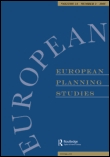
EUROPEAN PLANNING STUDIES
Transforming Planning Discourse Across EuropeEUROPEAN PLANNING STUDIES is a leading journal in the field of urban studies, published by Routledge Journals, Taylor & Francis Ltd. Since its inception in 1993, this esteemed publication has been pivotal in advancing the discourse on geographical, planning, and developmental issues across the European landscape. With a commendable 2023 Q1 rating in the Geography, Planning, and Development category and a remarkable rank of #88 out of 821 in Scopus, the journal is recognized for its rigorous peer-reviewed articles that provide innovative insights and critical analyses. Although the journal does not offer open access, it caters to a diverse readership, including researchers, professionals, and students, ensuring a comprehensive understanding of contemporary planning challenges and strategies. The journal's objectives include fostering interdisciplinary dialogue among planners, policymakers, and academics, making it an essential resource for those engaged in shaping sustainable urban environments and informed spatial governance in Europe and beyond.

JOURNAL OF PLANNING EDUCATION AND RESEARCH
Leading the Discourse in Planning and Urban StudiesJOURNAL OF PLANNING EDUCATION AND RESEARCH, published by SAGE Publications Inc, stands at the forefront of academic discourse in the fields of planning, geography, and urban studies. Established in 1981 and continuing through to 2024, this esteemed journal features cutting-edge research and critical analyses that address the pressing challenges of urbanization and community development. As a recognized leader with prestigious Q1 rankings in Development, Geography, Planning and Development, and Urban Studies categories, it ranks 22nd out of 279 in Urban Studies, underscoring its influence with a remarkable 92nd percentile ranking in the Scopus database. Although the journal does not currently offer open access options, it provides a vital platform for researchers, professionals, and students dedicated to understanding and shaping the complex dynamics of urban environments. With a commitment to advancing knowledge and practice, the journal supports interdisciplinary scholarship and encourages the publication of innovative ideas that foster sustainable urban solutions.

Italian Journal of Planning Practice
Empowering global discourse in architecture and urban studies.Italian Journal of Planning Practice is a premier Open Access journal dedicated to advancing knowledge in the fields of architecture, geography, planning, and urban studies. Published by the Italian Journal Planning Practice, this journal has been a vital platform for scholarly discourse since its inception in 2011, providing a rich repository of research that reflects contemporary issues in urban development and planning practices. With an ISSN of 2239-267X and operating from Rome, Italy, the journal serves a global audience, enhancing accessibility and fostering collaboration among researchers, professionals, and students alike. While currently positioned in the Q4 category across key disciplines, it continues to strive for excellence, encouraging submissions that push the boundaries of knowledge. As an Open Access journal, it promotes unrestricted access to its content, empowering a wider audience to engage with its findings and perspectives. In a rapidly changing urban landscape, the Italian Journal of Planning Practice stands as a crucial resource for innovative planning methodologies and research insights.
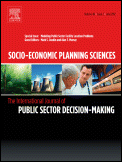
SOCIO-ECONOMIC PLANNING SCIENCES
Fostering collaboration between research, practice, and policy.SOCIO-ECONOMIC PLANNING SCIENCES, published by Elsevier Science Inc, is a leading journal in the interdisciplinary fields of economics and social sciences, with a strong focus on planning and development strategies from a socio-economic perspective. With an impact factor reflecting its prestigious standings, it has earned Q1 rankings in multiple categories, including Economics and Econometrics, Geography, Planning and Development, and Strategy and Management as of 2023. Its rigorous peer-reviewed framework ensures that the research disseminated is of the highest quality, making it a crucial resource for researchers, practitioners, and policymakers alike. The journal, which has been in continuous publication since 1967, also benefits from a wide reach through Scopus rankings, placing it in the top percentiles for numerous academic disciplines. By facilitating access to innovative methodologies, applied theories, and empirical analyses related to socio-economic planning, SOCIO-ECONOMIC PLANNING SCIENCES aims to foster a deeper understanding of interconnected social and economic systems, thus contributing to informed decision-making processes across various sectors.

Planlama-Planning
Connecting Ideas for Tomorrow's Urban LandscapesPlanlama-Planning is a distinguished journal published by KARE PUBL, dedicated to the evolving field of urban and regional planning. With its ISSN 1300-7319, it provides a platform for researchers, practitioners, and students to share innovative research and comprehensive reviews on critical planning issues and methodologies. Situated in Istanbul, Turkiye, the journal aims to facilitate discussions that address contemporary challenges in planning and promote sustainable development. Although currently not an open-access journal, it upholds rigorous peer-review standards to ensure high-quality publications. With a commitment to advancing knowledge and fostering collaboration across disciplines, Planlama-Planning stands as a crucial resource for those engaged in shaping cities and communities worldwide.

Territorios
Unveiling Insights in Contemporary Urban ChallengesTerritorios, an esteemed Open Access journal published by UNIV ROSARIO in Colombia since 1999, serves as a critical platform for the dissemination of knowledge in the fields of Geography, Urban Studies, and Development Planning. With an ISSN of 0123-8418 and an E-ISSN of 2215-7484, the journal has been recognized for its commitment to promoting rigorous research and innovative practices within its scope. In the 2023 evaluation, it achieved notable rankings, placing in the Q4 category in Geography, Planning and Development, and Q3 in Urban Studies, reflecting its growing impact in the social sciences. Although currently positioned in the lower percentiles, the journal plays an important role in amplifying diverse voices and perspectives, encouraging scholarly dialogue in an ever-evolving urban landscape. The address of the journal's home is found at PROGRAMA PSICOLOGIA, FAC MED, CARRERA 24 63 C-69 QUINTA DE MUTIS, BOGOTA, COLOMBIA. Researchers, professionals, and students seeking a comprehensive understanding of contemporary geographical issues and urban development trends will find Territorios to be an invaluable resource.
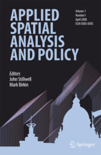
Applied Spatial Analysis and Policy
Exploring the intersection of geography and governance.Applied Spatial Analysis and Policy, published by Springer, is a leading journal dedicated to advancing knowledge in the field of spatial analysis and its application in policy-making. With an ISSN of 1874-463X and an E-ISSN of 1874-4621, this peer-reviewed journal has been at the forefront of geographical research since its inception in 2009 and continues to thrive with a convergence extending to 2024. As a recognized publication in the Geography, Planning and Development category, it holds a commendable Q2 quartile ranking for 2023 and is positioned at rank #238 out of 821 in the Scopus classification, reflecting its strong impact and relevance within the academic community with a percentile of 71. The journal provides a robust platform for researchers and professionals to explore innovative methodologies and empirical studies that enrich spatial policy frameworks. While access to individual articles is not open access, its significant contribution to the field makes it a vital resource for anyone involved in spatial analysis and related disciplines.

Raumforschung und Raumordnung-Spatial Research and Planning
Advancing spatial knowledge for a sustainable future.Raumforschung und Raumordnung - Spatial Research and Planning (ISSN: 0034-0111, E-ISSN: 1869-4179), published by OEKOM VERLAG GMBH, is a prominent scholarly journal based in Germany, focusing on critical issues in spatial research and planning. Established in 1977, this Open Access journal has been providing free access to its content since 1998, allowing researchers, professionals, and students to engage with high-quality studies exploring the intricacies of urban studies, environmental science, and geography. With a notable impact in its field, evidenced by its Q2 ranking in Urban Studies and Q3 rankings in Earth and Planetary Sciences, the journal plays a vital role in fostering interdisciplinary dialogue, advancing knowledge, and influencing policies across various spatial domains. It continues to evolve and adapt, having converged its years of publication effectively, making it a valuable resource for anyone looking to stay informed on the latest trends and research within the realms of spatial planning and environmental analysis.
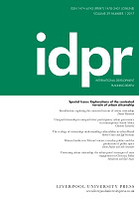
INTERNATIONAL DEVELOPMENT PLANNING REVIEW
Navigating the Complexities of Urban Planning and DevelopmentINTERNATIONAL DEVELOPMENT PLANNING REVIEW, published by Liverpool University Press, is a prominent interdisciplinary journal dedicated to advancing research in the fields of development, geography, and urban planning. With its ISSN 1474-6743 and E-ISSN 1478-3401, this journal presents high-quality scholarship aimed at understanding and addressing global development issues. Recognized in the 2023 category quartiles as Q2 in both Development and Geography, Planning and Development, it ranks within the top tiers of its fields, boasting an impressive Scopus ranking: 117th out of 306 in Social Sciences _ Development and 314th out of 821 in Social Sciences _ Geography, Planning and Development. INTERNATIONAL DEVELOPMENT PLANNING REVIEW serves as a vital platform for researchers, professionals, and students, offering insightful articles that contribute to scholarly discussions and policy formations while fostering critical engagement with contemporary challenges facing urban communities globally. Its commitment to disseminating valuable knowledge positions it at the forefront of development planning literature from 2002 to 2024 and beyond.

Town and Regional Planning
Cultivating knowledge for vibrant urban landscapes.Town and Regional Planning is a pivotal Open Access journal dedicated to advancing the fields of geography, urban studies, and regional planning. Published by the University of Free State, Department of Town & Regional Planning, this journal has been serving the academic community since 2010, ensuring that invaluable research is accessible to a global audience. With its ISSN 1012-280X and E-ISSN 2415-0495, the journal aims to foster innovative discussions and insights that address contemporary challenges in planning and policy-making within urban contexts, particularly in South Africa and surrounding regions. To highlight its credibility, as of 2023, Town and Regional Planning holds a Q3 quartile ranking in Geography, Planning and Development, and Urban Studies, alongside a Q4 ranking in Management, Monitoring, Policy and Law. This is complemented by its Scopus rankings, where it operates within the competitive landscapes of social sciences and environmental management. Researchers, professionals, and students are encouraged to explore articles that contribute to the development of sustainable and equitable urban environments.